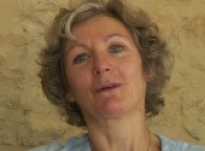Interview 136

Age at interview: 52
Age at diagnosis: 45
Brief Outline: Mantle Cell non-Hodgkin's lymphoma was diagnosed in 1999 after she found a lump in her thigh. She was treated with chemotherapy and rituximab. She is in remission.
Background: Retired Health Visitor, married with two adult stepchildren. Ethnic Background: White British.
More about me...
She found a lump in the top of her thigh, and wondered whether it might be a secondary tumour from the breast cancer she'd had three years earlier. When the lump hadn't gone away after several weeks she decided to consult the GP. She saw a locum GP who thought it was nothing to worry about, but when pressed agreed to arrange for an ultrasound scan. The radiographer suspected an aneurism and suggested she see a vascular surgeon. The vascular surgeon said it wasn't an aneurism but did an MRI scan that showed it to be an enlarged lymph node, and a fine needle aspiration that confirmed it was high grade non-Hodgkin's lymphoma, so referred her to a haematologist. The lump was removed and the pathology results classified the lymphoma as Mantle Cell, which usually has a poor prognosis, although a CAT scan confirmed that it had not spread beyond the one lymph node.
The treatment plan was for CHOP chemotherapy followed by localised radiotherapy. However, after 3 chemotherapy sessions a bone marrow biopsy showed lymphoma in her bone marrow so the radiotherapy was cancelled and the chemotherapy changed to the more aggressive ESHAP. She had one dose of ESHAP followed by a dose of rituximab, and a second dose of ESHAP. They then harvested her stem cells to store for a possible future stem cell transplant if she were to relapse. Her sisters were tested to see if they could also be stem cell donors if necessary in the future, and one was found to be a perfect match. A bone marrow biopsy then showed that she was in remission.
She returned to work as a health visitor for a short while but was advised to retire on health grounds, which she did. She is now a patient representative on a professional body and a magistrate.
After her breast cancer 8 years ago she had tried to make the most of each day but has since slid into old habits.
After her breast cancer 8 years ago she had tried to make the most of each day but has since slid into old habits.
SHOW TEXT VERSION
PRINT TRANSCRIPT
My husband runs his business interests from home. We have our two dogs, we walk the dogs, we enjoy life, we’re busy, but I now take time to do what I call ‘sniff the air’. And on a beautiful day like today you stop and you think, “Hey God, isn’t it good to be alive?” And that’s actually I think the difference is that now we take life as it comes, we enjoy life for what it is, which is something that so many people just don’t do. And if you ask me, you know, having had cancer twice, am I unlucky? I would say no, I’ve been incredibly lucky because it’s made us realise how important life is, and we enjoy it.
She is having regular check-ups during her remission from mantle cell lymphoma; she has an enlarged lymph gland in her neck but her specialist says it's not a problem yet.
She is having regular check-ups during her remission from mantle cell lymphoma; she has an enlarged lymph gland in her neck but her specialist says it's not a problem yet.
SHOW TEXT VERSION
PRINT TRANSCRIPT
Okay, you said you’re doing watch and wait seven years on, how often do you have to go and see your consultant?
It’s usually, these days it’s usually six months, if I have a bit of a wobbly, like I’ve got a lymph node which has been growing in my neck, it’s growing very slowly, my consultant is not at all worried about it, he tells me that he knows people without lymphatic cancer who’ve got bigger lymph nodes than I have. But naturally enough, you know, when you have lymphatic cancer and your lymph nodes do start to enlarge you get worried. So periodically he’ll say, “Well come and see me in four months”, you know, but normally six months. And as he usually says to me, he says, “ You’ll know before I do because you’ll start getting, you know, the night sweats or the weight loss or whatever”. But I mean, yes, I do get hot at night and, yes, I do lose weight occasionally, and I go and tell him and he says, “No you’re fine”. And then also I have blood tests at the same time and he always says, “If there’s a problem I’ll let you know”. But it is a question of trust I think, I trust his judgement and he has never been wrong. And I don’t trust my judgement because I often am, because I sort of think, you know, “Yes I think it’s coming back”, but it’s not, so… But normally between four and six months, usually six months unless there’s a problem, or I think, I perceive there’s a problem.
So you still haven’t had any real serious night sweats or anything?
No, no I’ve had no symptoms, no, as I say, apart from this one lymph node which is growing slowly but steadily, just to remind me it’s still there.

